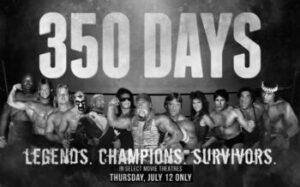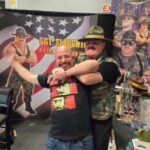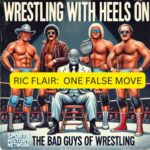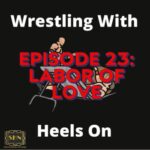The most common regret expressed by people before they die is: “ I wish I had spent more time with the people I love.” That’s a sentiment echoed throughout 350 DAYS, a film by Fulvio Cecere and Darren Antola, focusing on the toll pro wrestlers endure on their bodies, families, and psyches working all year round on the road. For most of the wrestlers, the 350 days away from their families was the most severe toll of all. Having missed so many holiday seasons away from my family working to make ends meet, I identified with them, as will many viewers who’ve had to make similar sacrifices. “ I wish I had spent more time with the people I love. ”
There’s a lot to love about 350 DAYS. For one thing, it is chock-full of wrestling superstars: Wendy Richter, Brett Hart, Lanny Poffo, Abdullah the Butcher, Ted DiBiase, Superstar Billy Graham, Ox Baker, George “The Animal” Steele, “Mr. Wonderful” Paul Orndorff, Tito Santana, J.J. Dillon, and Greg “The Hammer” Valentine, to name but a few.
I’ve enjoyed watching all of these wrestlers in the past, but what was even more enjoyable was listening to them talk with a plain-spokenness you don’t even hear on some of the best wrestling shoots on the internet. That’s because you don’t have to contend with interviewer questions.
It’s just the wrestler and the camera at the wrestler’s home or some other comfortable location. The filmmakers were smart to make it as intimate as it felt. You get to the point where you feel like it’s just you and Ted DiBiase chatting in his basement.
350 Days Released
My best friend Sal told me about 350 when it was first released in 2018. He watched it in a theatre in Manhattan. At that particular showing, there was a Q&A about the film with Greg Valentine and the filmmakers. It sounded like a good time and I wish I’d been there. Nevertheless, for reasons I’m not sure of, I avoided seeing the movie.
Maybe it was because I was in the throes of working nonstop myself at the time that the idea of watching a movie about people working nonstop had little appeal to me, even if it was about wrestling. That’s my alibi and I’m sticking to it. Eh, whatever it was, I couldn’t bring myself to watch it.
I Finally Watched It
Flash forward to Christmas Day 2023 and I’m watching a downloaded version of 350 so I can stay awake in the wee hours of the morning. Not only does it keep me awake, it moves and inspires me.
There was a lump in my throat as I listened to Brett Hart talk about missing his kids’ first Halloween, how he’d never get that day back. He talked about missing their birthdays, and special school events and there were tears welling in my eyes. “I have to say something about this on the podcast”, I thought to myself.
Now, there’s no comparing missing a few holiday seasons here and there to whole years without your family. That’s a lot of catching up to do when you get home. And then you have to consider the discomfort of being home after such a long absence, trying to keep time to the daily rhythms of family life.
Every family has their own rhythm, their own dynamic. A long enough time away from your wife and kids and you find you’re playing off-beat, trying to jump in where you left off, trying to be relevant again. Four overnights in a row of sixteen-hour shifts throw me out of sync all the time. 350 days on the road, and you’re practically a stranger in your own home.
It’s easy to see how you can lose yourself at an on-the-road job. There’s the freedom of nobody looking over your shoulder, the freedom of changing locations, the freedom of being somebody different wherever you go—if that’s your thing that is.
Hell, you can even put a positive spin on it and call working on the road a “location-independent lifestyle.” Sounds very attractive when it’s phrased that way, doesn’t it? In an era without cell phones, it must’ve been very easy for these wrestlers to lose themselves on the road, especially if they didn’t want to be found, or craved disconnection from their families.
Along the way, traveling from town to town, there are all kinds of temptations. First, there’s the abundance of sex to be had. Superstar Billy Graham called the wrestling groupies who stuck around after the matches to hook up with their favorite wrestlers “Ring Rats.” Greg Valentine recalled up to 35 women lining up at hotels to be picked out by him and Ric Flair on any given night. Women of all ages were throwing themselves at these wrestlers and they took full advantage. Rock stars and athletes of all stripes did the same thing. Why should wrestlers be any different?
Promiscuity Comes With A Price
But like any kind of excessive behavior, promiscuity comes with a price tag. There were unwanted pregnancies, sexual diseases, self-degradation, and broken marriages. J.J. Dillon tells us his three marriages failed because of his philandering ways on the road.
Ted DiBiase tells us how his wife’s mercy and grace gave him a second chance at sexual faithfulness to her, saving their marriage in the process. And such is the case for many of the wrestlers featured in 350: broken promises, broken marriages, sometimes redemption.
Then, of course, there’s the all-night partying and the drugs. At this point in the peeling back of wrestling’s curtain, you can’t watch any wrestling shoot or documentary without the obligatory drug use stories. 350 Days is not much different, but there was one poignant segment when Brett Hart reminisced about his cocaine use and the drug’s powerful ability to open up people’s souls.
He spoke to all-night talking jags in which he learned so much about the inner lives of his traveling companions. Cocaine was like a truth-telling serum that eroded the veneer of toughness these wrestlers wore every day. And then there were those who did not partake in the drugging and debauchery—men like Lanny Poffo.
If there’s one dissenter in this movie, it’s Lanny Poffo. According to Poffo, the rigors of the road did not lead him to drug use and it did not lead him to marital infidelity. In fact, Poffo was very adamant that the demands of the wrestling profession should not be blamed for any of the on-the-road bad behavior.
Lanny Poffo's Take
In a 2019 WBZ/CBS NEWS interview, Lanny Poffo had this to say about the whole premise of the documentary:
“ I think if you get a divorce, you should look in the mirror and blame yourself, either for marrying her or divorcing her or whatever, or not being a good husband, or whatever. It’s a failure that everybody is looking for a scapegoat, and sometimes the scapegoat is the wrestling business. Then they get into some other line of work, and they still get a divorce. So I believe in looking in the mirror and taking your own responsibility. Wrestling, for me, has been nothing but positive. I’m 64, I don’t go around with a chip on my shoulder that I got mistreated by wrestling.”
Sadly, Leaping Lanny Poffo died on February 2, 2023, of congestive heart failure. He was 68. His positive take on the 50 weeks of wrestling on the road was refreshing, but he is definitely in the minority. Lanny was also Macho Man Randy Savage’s younger brother and the son of Angelo Poffo. He had his own podcast called THE GENIUS CAST with Lanny Poffo.
How I Can Relate
Because working a graveyard shift (11 p.m. to 7 a.m.) comes with its own set of perils, like higher incidences of cardiovascular disease, higher cholesterol, increased depression, and a higher risk of divorce (about 57 percent), 350’s broken family theme really resonated with me.
The fault lies with the domestic disruption caused by shift work. The spouse left alone at home can experience feelings of loneliness and insecurity. The steady paychecks coming in never seem to compensate for the absences.
When I was a kid watching pay-per-view events like SURVIVOR SERIES, it never occurred to me my favorite WWE wrestlers were not going home to spend Thanksgiving with their families. It was probably just another Thursday to them, or maybe it wasn’t.
Maybe it hurt them tremendously to be away. It never occurred to me to think these men and women were human beings first, that somebody was missing their daddy or mommy.
The power of 350 is its ability to humanize these larger-than-life performers. Wrestling is not just entertainment, it’s real work, and like any real work, it has its pros and cons. And like all work over time, the question becomes whether any of it is worth it.
Every year I work holidays, I tell myself next year I won’t work Christmas or New Year’s Day, next year I’ll be home. It’s a promise I want to keep, but every year seems to bring me a new set of financial challenges that change my plans.
I think Lanny Poffo was right. No one holds a gun to your head. We have the opportunity to make choices, make some compromises. Maybe don’t work every holiday. Maybe say no. No is a sentence. Maybe think about that most common of regrets:
“I wish I had spent more time with the people I love.” No one ever says: “I wish I had spent more time at work.” None of the wrestlers in 350 said they would do it any differently.
They all acknowledged wrestling was good to them despite the physical and emotional damage they incurred. There are experiences to be counted too.
The other great thing about 350 are the many photographs interspersed between interviews of wrestlers carrying luggage, getting in and out of cars, hanging out at bars and eateries, and airports. These are some of the most unguarded moments of superstar wrestlers you’ll ever see, a true testament to the workaday world of professional wrestling most of us never get to glimpse.
In many ways, I think 350 probably the most revealing pro wrestling documentary ever made. It’s quiet, hypnotic, and candid. Most of all, it’s real. Real enough to make me look inward to realize what I’ve been missing this whole time; real enough to make me wonder if I’ll do it again next year.
Lanny Poffo's Rules For Life
Before I go, I’d like to share these 5 life rules with you. Lanny Poffo shared them on his show and I thought I’d share them with you. We can all take these truthful nuggets of wisdom with us into the New Year and beyond:
1) TALK TO YOUR LOVED ONES WHO LEFT THIS WORLD BEFORE YOU. THEY CAN STILL HEAR YOU.
2) SEND LOVE TO YOUR LOVED ONES WHO ARE STILL WITH YOU IN THIS WORLD. THEY ARE STILL BESIDE YOU.
3) SPREAD LOVE AND KINDNESS. THE LIGHT ALREADY SURROUNDS YOU. LET IT FLOW THROUGH YOU.
4) HONOR YOUR OWN LIFE. YOU ARE ALIVE! HOW AMAZING IS THAT? WE MAY NOT KNOW WHAT THE NEXT ADVENTURE WILL BE, BUT THIS ONE IS HAPPENING RIGHT NOW. FEEL IT! DO SOMETHING WITH IT. LIVE THE LIFE YOU WANT TO DO NOW.
5) DECIDE THIS TRUE. SNOWFLAKES NEVER GO AWAY. THEY SIMPLY CHANGE FORM, FROM SOLID TO LIQUID, LIQUID TO SOLID, FROM THE SEEN TO THE UNSEEN. THIS IS YOU. THIS IS THE LOVE YOU THOUGHT YOU LOST, TOGETHER MELTING INTO ONENESS.
You’ve been listening to WRESTLING WITH HEELS ON, only on the SPORTS HISTORY NETWORK.
Let’s try to take another stroll down villainy lane in two weeks. 158 days is way too long to stay away from anyone.
Hi everyone. My name is Ariel Gonzalez, originally from Brooklyn, now living in the Garden State and I have a new podcast called “Wrestling With Heels On.”
On the podcast, I get to reminisce about my favorite wrestling bad guys from yesteryear. Light on stats and heavy on nostalgia, this little trip down villainy lane gives me a chance to visit the dark corridors of my wrestling soul, and it’s also fun to have a podcast.
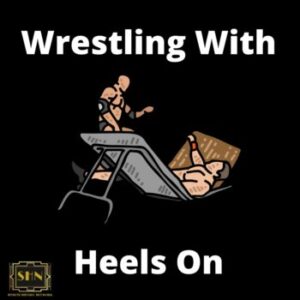
Please Note – As an Amazon Associate I earn from qualifying purchases
Resources
More Wrestling History
A Lamb to the Slaughter (WWE Superstar – Sergeant Slaughter)
There’s a reason there’s never been a mainstream movie about...
Read MoreWrestling With Andre: A Parody of My Dinner With Andre
I am a big fan of the 1981 film My...
Read MoreRic Flair’s Fake Heart Attack: The Shocking WCW Moment That Fooled Fans
A few weeks ago I found an Instagram video of...
Read MoreTAKE THIS JOB and LOVE IT!!!
INTRO (JINGLE): AMERICAN TOP 40 CASEY KASEM (IMPRESSION): You’re listening...
Read More